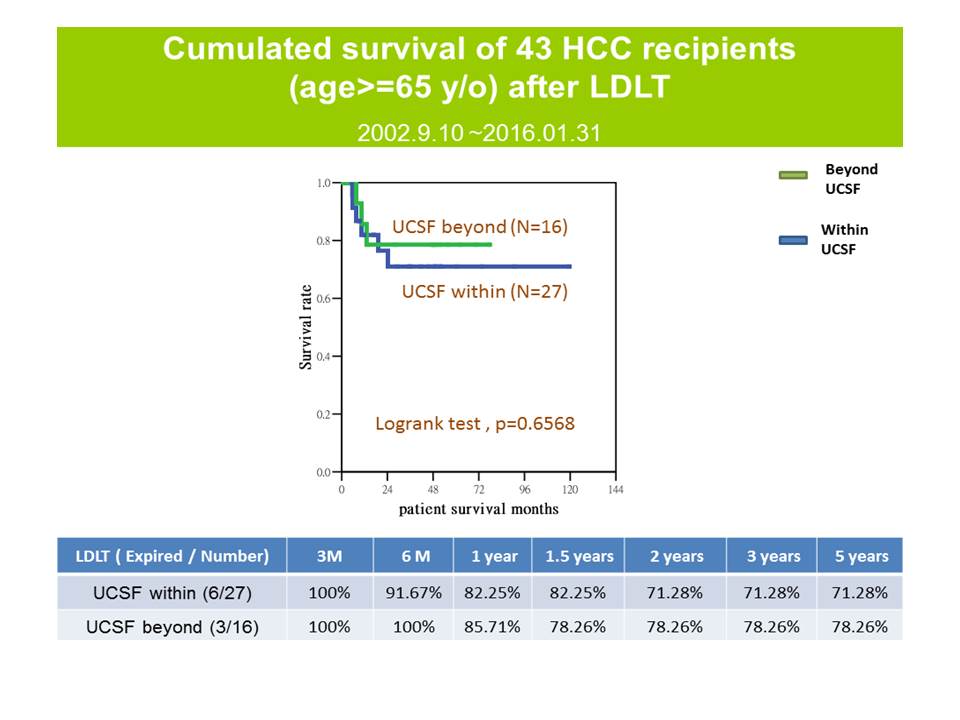Outcome After Living Donor Liver Transplantation for Hepatocellular Carcinoma in Elderly Patients > 65 Years: Assessing the Long Term Survival.
Organ Transplantation, China Medical University Hospital, Taichung, Taiwan
Meeting: 2017 American Transplant Congress
Abstract number: A75
Keywords: Hepatocellular carcinoma, Liver transplantation
Session Information
Session Name: Poster Session A: Clinical Science: Liver - Hepatocellular Carcinoma and Cholangiocarcinoma Malignancies
Session Type: Poster Session
Date: Saturday, April 29, 2017
Session Time: 5:30pm-7:30pm
 Presentation Time: 5:30pm-7:30pm
Presentation Time: 5:30pm-7:30pm
Location: Hall D1
Background:
In Asia, the hepatocellular carcinoma (HCC) is most common cancer. Despite of the surveillance most tumors are diagnosed at late stages and thus HCC continues to have a poor prognosis. Living donor liver transplantation (LDLT) is a quick source of donor liver allografts for the waitlisted unresectable HCC patients that fall within acceptable criteria. This success has expanded the pool of transplant recipients to include persons previously considered ineligible because of advanced age and comorbid conditions. In addition, the relative percentage of HCC in older age groups has been recently increased. In this retrospective analysis we aim to prove the safety of LDLT in elderly patients >60 years of age with HCC that are comparable to the results obtainable in other age groups.
Materials and Methods:
From August 2002 to January 2016, a total of 695 LDLTs were done at China Medical University Hospital, Taiwan. The patients of age >65 years that underwent LDLT for HCC were selected (n=43). The long term outcome of LDLT for HCC was analyzed and compared with patient population < 65 years that underwent liver transplantation for underlying HCC during same time period (n=286).
Results:
The study cohort comprised of 43 patients (Male:Female,31:12). The mean age was 67 ± 2.5 years (range,65 to 75 years). The 15 patients had HBV related HCC, 22 patients had HCV related HCC and 4 patients had HBV-HCV co-infection. Two of the patients did not have any viral infection as underlying etiology. Overall 5-year survival of the study cohort was 73.75% whereas for the patient age group <65 years (n=286) it was 58.48%. For the patients within UCSF criteria (n=27), the 1-year and 5-year survival was 81.25% and 71.28%, respectively. The characteristic finding was for the patients beyond the UCSF criteria (n=16) that showed a 5-year overall survival of 78.26%.
Conclusions:
With a follow up period that ranged from 2 years to 14 years, survival and graft functioning was comparable in patients of age group > 65 years that underwent LDLT for HCC.
CITATION INFORMATION: Thorat A, Hsu S.-C, Jeng L.-B, Yang H.-R, Li P.-C, Yeh C.-C, Chen T.-H, Poon K.-S. Outcome After Living Donor Liver Transplantation for Hepatocellular Carcinoma in Elderly Patients > 65 Years: Assessing the Long Term Survival. Am J Transplant. 2017;17 (suppl 3).
To cite this abstract in AMA style:
Thorat A, Hsu S-C, Jeng L-B, Yang H-R, Li P-C, Yeh C-C, Chen T-H, Poon K-S. Outcome After Living Donor Liver Transplantation for Hepatocellular Carcinoma in Elderly Patients > 65 Years: Assessing the Long Term Survival. [abstract]. Am J Transplant. 2017; 17 (suppl 3). https://atcmeetingabstracts.com/abstract/outcome-after-living-donor-liver-transplantation-for-hepatocellular-carcinoma-in-elderly-patients-65-years-assessing-the-long-term-survival/. Accessed February 21, 2026.« Back to 2017 American Transplant Congress
